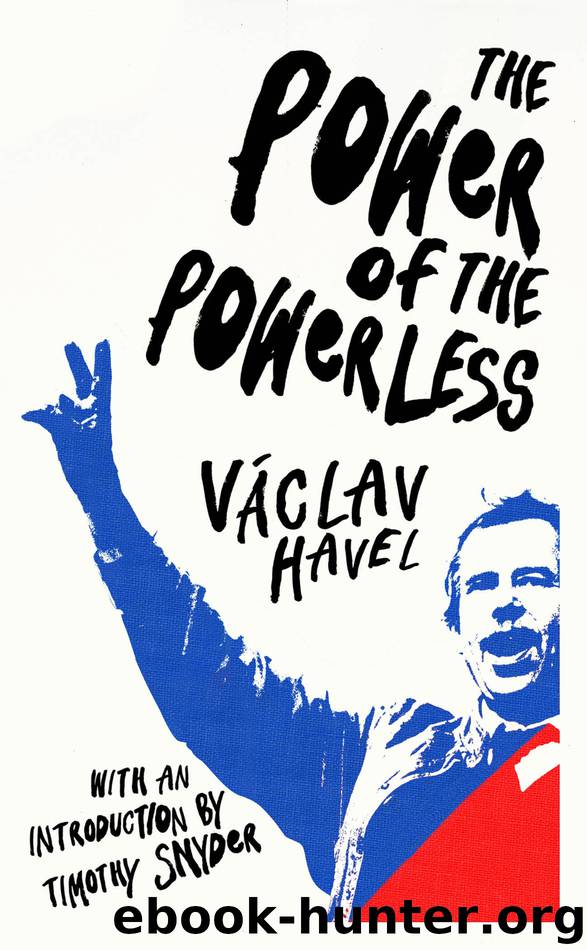The Power of the Powerless by Václav Havel

Author:Václav Havel
Language: eng
Format: epub
Publisher: Random House
XIII
If the term ‘opposition’ has been imported from democratic societies into the post-totalitarian system without general agreement on what the word means in conditions that are so different, then the term ‘dissident’ was, on the contrary, chosen by western journalists and is now generally accepted as the label for a phenomenon peculiar to the post-totalitarian system and almost never occurring – at least not in that form – in democratic societies.
Who are these ‘dissidents’?
It seems that the term is applied primarily to citizens of the Soviet bloc who have decided to live within the truth and who, in addition, meet the following criteria:
1. They express their nonconformist positions and critical opinions publicly and systematically, within the very strict limits available to them, and because of this, they are known in the West.
2. Despite being unable to publish at home and despite every possible form of persecution by their governments, they have, by virtue of their attitudes, managed to win a certain esteem, both from the public and from their government, and thus they actually enjoy a very limited and very strange degree of indirect, actual power in their own milieu as well. This either protects them from the worst forms of persecution, or at least it ensures that if they are persecuted, it will mean certain political complications for their governments.
3. The horizon of their critical attention and their commitment reaches beyond the narrow context of their immediate surroundings or special interests to embrace more general causes and, thus, their work becomes political in nature, although the degree to which they think of themselves as a directly political force may vary a great deal.
4. They are people who lean towards intellectual pursuits, that is, they are ‘writing’ people, people for whom the written word is the primary – and often the only – political medium they command, and that can gain them attention, particularly from abroad. Other ways in which they seek to live within the truth are either lost to the foreign observer in the elusive local milieu or – if they reach beyond this local framework – they appear to be only somewhat less visible complements to what they have written.
5. Regardless of their actual vocations, these people are talked about in the West more frequently in terms of their activities as committed citizens, or in terms of the critical, political aspects of their work, than in terms of the ‘real’ work they do in their own fields. From personal experience, I know that there is an invisible line you cross – without even wanting to or becoming aware of it – beyond which they cease to treat you as a writer who happens to be a concerned citizen and begin talking of you as a ‘dissident’ who almost incidentally (in his or her spare time, perhaps?) happens to write plays as well.
Unquestionably, there are people who meet all of these criteria. What is debatable is whether we should be using a special term for a group defined
Download
This site does not store any files on its server. We only index and link to content provided by other sites. Please contact the content providers to delete copyright contents if any and email us, we'll remove relevant links or contents immediately.
The Secret History by Donna Tartt(19092)
The Social Justice Warrior Handbook by Lisa De Pasquale(12190)
Thirteen Reasons Why by Jay Asher(8912)
This Is How You Lose Her by Junot Diaz(6889)
Weapons of Math Destruction by Cathy O'Neil(6281)
Zero to One by Peter Thiel(5802)
Beartown by Fredrik Backman(5756)
The Myth of the Strong Leader by Archie Brown(5509)
The Fire Next Time by James Baldwin(5447)
How Democracies Die by Steven Levitsky & Daniel Ziblatt(5219)
Promise Me, Dad by Joe Biden(5154)
Stone's Rules by Roger Stone(5088)
A Higher Loyalty: Truth, Lies, and Leadership by James Comey(4964)
100 Deadly Skills by Clint Emerson(4926)
Rise and Kill First by Ronen Bergman(4790)
Secrecy World by Jake Bernstein(4753)
The David Icke Guide to the Global Conspiracy (and how to end it) by David Icke(4720)
The Farm by Tom Rob Smith(4514)
The Doomsday Machine by Daniel Ellsberg(4490)
